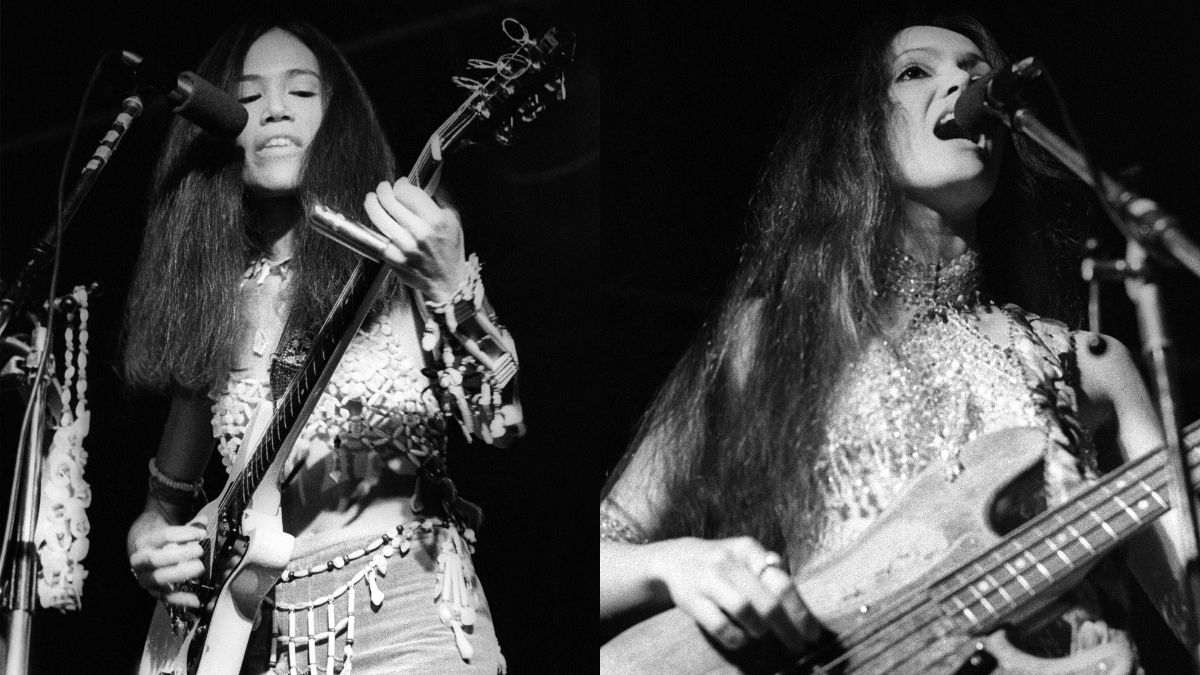Kurt Vile: “What you’re trying to do when you’re writing a song, with vocals, lyrics and guitar, is to not think at all. Just lay it down fast”
The singer-songwriter and producer on how writing songs and playing guitar is about capturing a “perfect moment” – and that’s precisely why you need to keep the recorder running
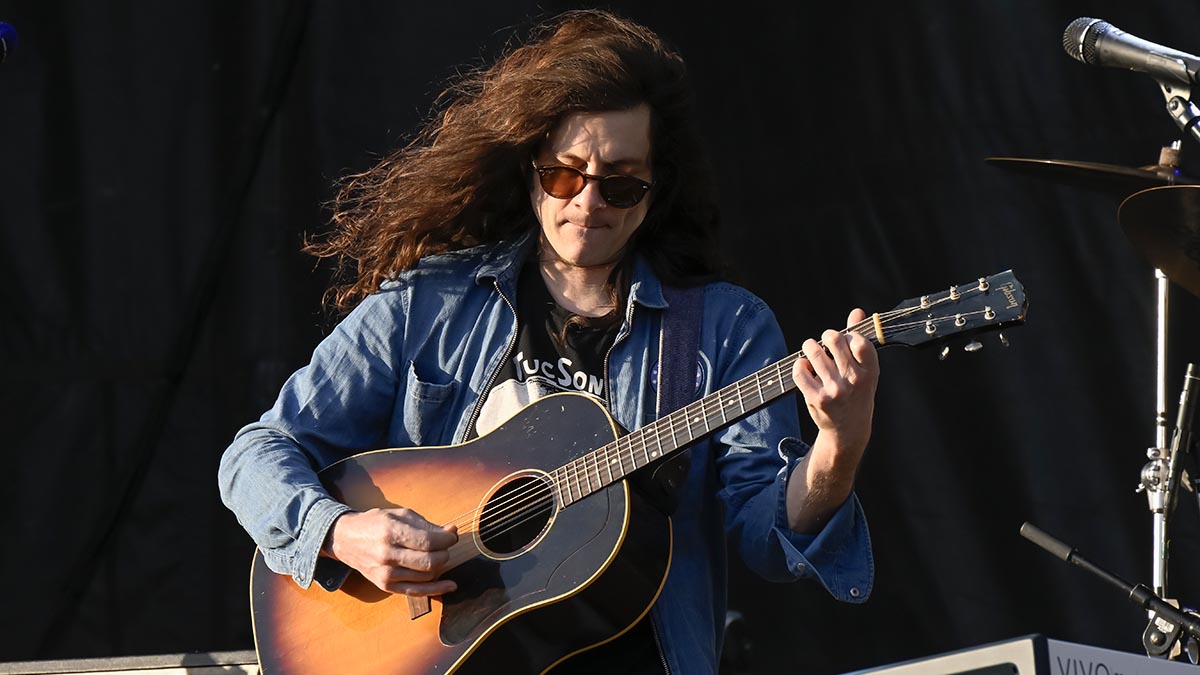
All the latest guitar news, interviews, lessons, reviews, deals and more, direct to your inbox!
You are now subscribed
Your newsletter sign-up was successful
One of the most cruel misfortunes to befall musicians of any stripe is when the memory fails just as their inspiration and abilities converge at the summit of their creative Kilimanjaro. Our best ideas are often the most perishable, first to evaporate if we don’t document them.
Kurt Vile is alive to the danger. He takes every precaution, booby-trapping his home studio with recording devices to ensure those song ideas get committed to something more reliable than the grey matter. The ideas might not seem like much in the moment, but that’s okay – because sometimes there’s gold right there, just waiting to be extracted.
“You just lay stuff down really fast with some keys, guitar, or whatever you have, and you’d be surprised,” he explains, speaking from his home studio, OKV Central. “Because what you’re trying to do when you’re writing a song, with vocals, lyrics and guitar, is to not think at all. Just lay it down fast. Like Sun Ra, he recorded everything, rehearsals and whatnot.
“That’s what a looper is there for: just for laying something down fast, and you will be surprised that, just because you were walking by, playing music, it captures it, and you have this whole song you didn’t otherwise have.”
His recording career was built on such moments. When he was a member of The War on Drugs – the band he co-founded with Adam Granduciel – Kurt was already establishing an alternative canon with a DIY production style, squirrelling songs away on CD-Rs. His setup was rudimentary but has since evolved.
There’s been personal growth – parenthood, hitting his 40s, actually becoming a pretty big deal, producing the latest Dinosaur Jr. album, Sweep It Into Space – but his ethos and multi-instrumentalist approach have not changed too much.
One thing Kurt has learned over the years is that you can’t possibly have too many recording devices. Use tape recorders, Zoom multi-track field recorders, whatever comes to hand, and especially the looper pedal, because that can be the most valuable of them all, allowing you to record without giving a second thought to the red light. Without, as he says, thinking at all, which is how much of his new album, (Watch My Moves), was written.
All the latest guitar news, interviews, lessons, reviews, deals and more, direct to your inbox!
“I have several generations of those Boss loopers, and there’s lots of stuff on this record alone where I just treat it like a tape machine, like a recorder without a loop but then it ends up looping anyway,” he says. “I learned that on this album, recording constantly and then going back to them. I used to not do that. I would show up in the studio and then start from scratch. But these are different times.”
Kurt has an unconsciously disguised professionalism. He doesn’t seem the ruthlessly efficient type when he talks to Total Guitar over Zoom, dressed in a flannel shirt and a Willie Nelson & Family trucker hat, with an easygoing demeanour that suggests he is rarely unmoored from a sense of equilibrium.
But (Watch My Moves) is a considerable body of work that can only be the product of a certain brand of efficiency and discipline, and perhaps even faith, too. Faith in the sense of letting the imagination out to forage and trust what it’ll bring back, a form of quasi-automatic writing that holds song ideas in suspension, as though in a dream.
“Yeah, I like to just get lost in strumming the guitar,” he says. “Like the line on Flyin’ (In A Fast Train), ‘Playing in the music room in my underwear...’, at that moment, I literally was!”
The memory makes him chuckle. Then it gets serious. How do you finish a track like that, a gentle song, a loose-leaf Americana hip-hop vibe? The risk is that it gets overworked and tightens up.
“When I was trying to get the song recorded, my family went away – it was like the first summer of the pandemic,” he says. “I stayed, like, ‘I gotta get to know this Marantz four-track!’ I just had this Uni-Vox drum machine, and I sped it up, because I had it down a little too slow, and the next thing you know I’m just sitting and strumming.
It’s kinda funny because you said it was like Americana hip-hop, and strangely enough, the pop star Kei$ha asked me to help her write some songs. I was flattered! Like, ‘Really?’
“It’s kinda funny because you said it was like Americana hip-hop, and strangely enough, the pop star Kei$ha asked me to help her write some songs. I was flattered! Like, ‘Really?’ At the time, I was listening to some of her music, and the way she delivers fast it is kind of hip-hop.
“I was trying to make it poppy but it came out through me with a Martin acoustic 12-string I got recently, and floaty vocals, just captured at that right time when the song was fully written. I just walked around the block – it was literally all you could do – and the next thing you know the sun went down and I was home alone, feeling pretty good about myself, like in outer space. I think all that’s captured in that song.”
Mount Airy Hill (Way Gone) was another song that arrived unannounced. Within minutes, he had the lyrics and was singing it over the arpeggiator on a Yamaha organ. The task, again, was to record it, and put flesh on the arrangements.
That’s when his band, the Violators, came in and the opportunity arose to put slide guitar over it, using his old Rodeo electric with the gold-foil pickups – the one from the cover of his 2008 debut Constant Hitmaker.
“I can’t remember if I tried slide on something else first but it just really sung on that thing,” he says. “It’s really beat-up but those gold-foil pickups just have this special sound. That’s the secret to my early sound. I just rehearsed again with a couple of the bandmates, and at first I was trying to play that slide part on a Jazzmaster or something, and sure enough, I was like, ‘Hand me that Rodeo!’”
Mount Airy Hill (Way Gone) is of special significance. That’s a hometown song. Kurt took off the headphones to track his vocals and organ, “trying to just ignore the technology” and to keep it as natural and low-key, as if he were just talking to a friend.
His songwriting is deceptive like that. It’s disarming, a stream of consciousness gathering observational data as it goes, wry asides, lyrics in a meter that help draw the instrumentation forward, everyday stuff, before it establishes a momentum, taking the scenic route to someplace profound.
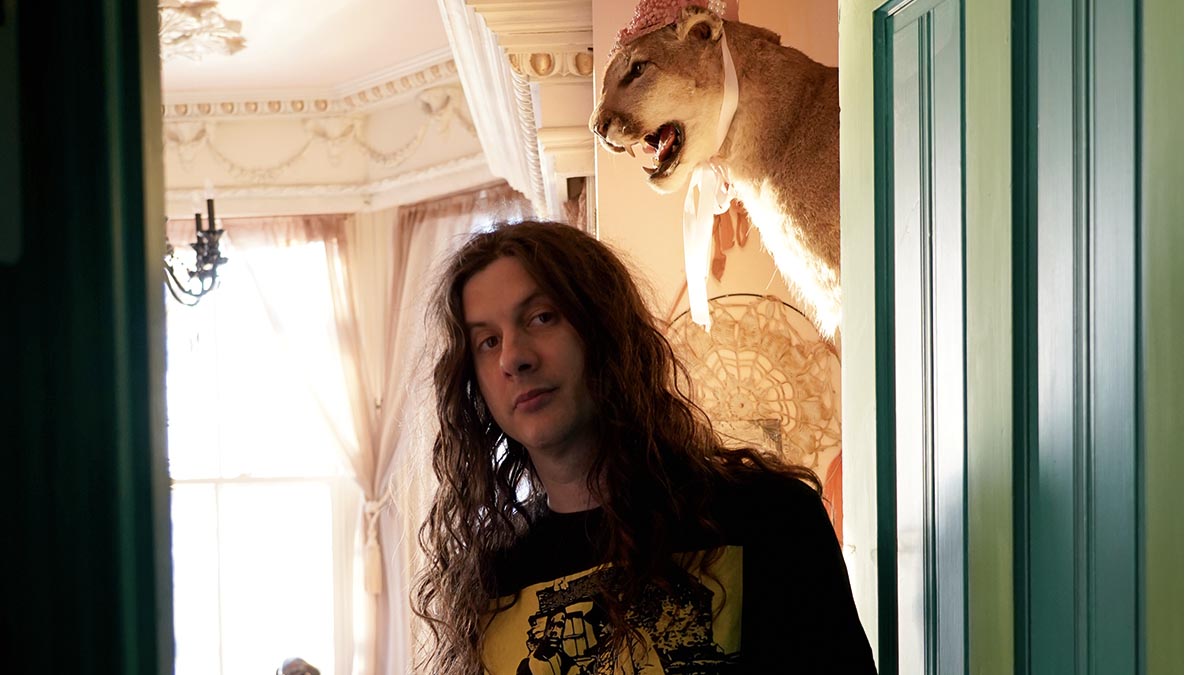
The blend of the everyday and the profound establishes a dramatic tension. Songs such as Going on a Plane Today are like children’s music for existentialists. Even the title of the album speaks to a sense that Kurt has retained the ability to look at the world as a child might, calling it as they see it without any filter. But if children lack the wisdom and emotional maturity to always make sense of their experiences, a 40-something adult at least stands a better chance.
“I really like my 40s. I like them a lot,” he says. “I sort of dreaded them, just the number, when I was in my late-30s. Even in the very earliest sessions on this record I wasn’t even fully ready to record but I forced myself to go into the studio before I hit 40, y’know!
“But now, I like my 40s because I feel like, growing up, you’ve got a lot to prove, a lot to figure out. Now I can tap into it but I don’t have so much to prove. What have I got to prove is what I have to prove; it’s not such a contest any more. Not to say I am not competitive et cetera, it’s just a little different.”
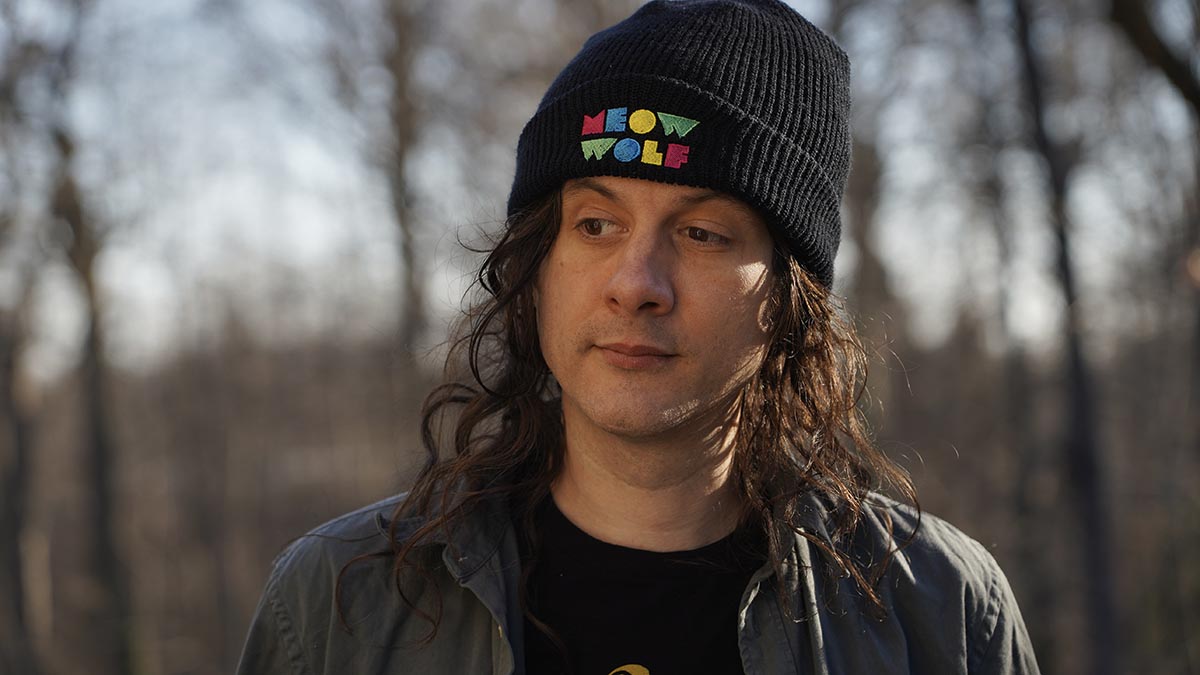
Kurt recorded (Watch My Moves) over various sessions at OKV Central, and in Rob Schnapf’s Mant Sounds, Los Angeles. Songs such as the Bruce Springsteen cover Wages of Sin were performed and recorded live with the Violators in the studio. “I have heard this song a hundred times and I know I can nail it vocally, and then I can just improvise my guitar over it,” he says.
Others offered him the opportunity to bring a host of guests onboard, with Chastity Belt performing on the nostalgic acoustic folk of Chazzy Don’t Mind, James Stewart of the Sun Ra Arkestra playing saxophone on Goin’ on a Plane Today and the epic and trippy Like Exploding Stones, extra drums and percussion coming by way of Warpaint’s Stella Mozgawa and Hot Chip’s Sarah Jones, while Cate Le Bon joins him for a duet on Jesus on a Wire.
Kurt plays around with a lot of different styles and textures. At times, his guitar playing recalls Ry Cooder, or even Mark Knopfler, but in context with synth and keys, these motifs serve a higher purpose. How Kurt presents his instrumentation has a similar effect on the audience as his lyrics.
He can be direct and accessible, honest and humane, but there’s a soft-focus to his sound, a gauzy texture to the production; (Watch My Moves) is like an audiophile’s interpretation of lo-fi, designed to encourage the audience to lean into the arrangement and take from it what they want.
“That used to be what I was doing all the time with cheaper equipment and recording myself,” he says. “I also came to the realisation that, one, you do it as live as possible, two, you clutter it up as little as possible, and three, you put as little reverb and delay on there that you used to think helped it, but a lot of times the vocals cut through if you keep it dry. You’ve still got to find the tone, and that’s the beauty of playing in the moment. Like you pick up a guitar and you get lost in one chord.”
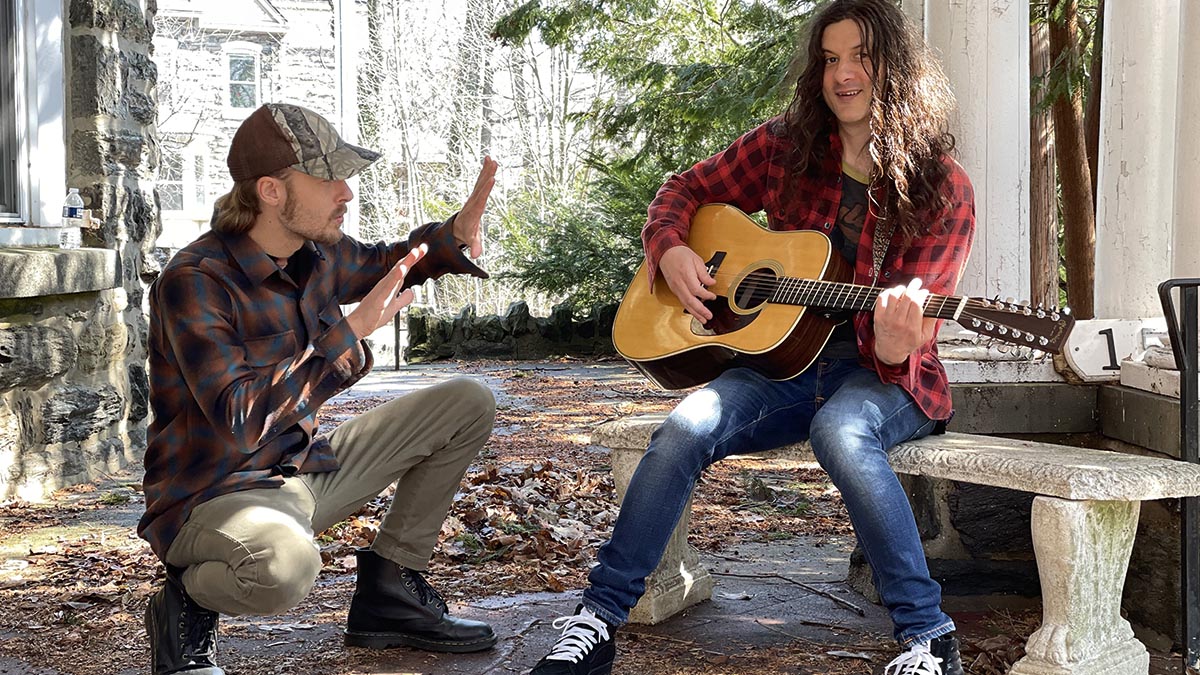
Kurt pans his camera round and talks through some of his most important pieces of gear, like the Moog Matriarch that gets a shoutout on Like Exploding Stones, and an upright piano that’s leaned against the wall behind him.
“It is sometimes more spiritual than the guitar,” he says. “Any time you go over to it you’ll be sort of writing; it’s all there in front of you.”
There were plenty of guitars in the mix, too. An old orange Gretsch – “I can’t remember the number now, 6120? Whatever!” – that reminded Vile of Neil Young’s On The Beach tone. “Once I picked that one up it was hard to put down, and it’s just cool how you get to know instruments as you are getting to make the record,” he says.
Schnapf’s ’65 Fender Jazzmaster, a big favourite of Kurt’s, was most notably used for Wages Of Sin, its signal fed through an ADA Flanger, and maybe a Memory Man and a “dirtied-up” vintage Fender Deluxe. Vile is hazy on the details. “I am just shoegazing on that tremolo arm, just going down, downward into ground,” he says. “If you want to get the straight, gnarlyish but warm, analogue sound, go through those ADA Flangers.”
That’s how it goes in the studio, he explains, when the writing is near-done and the deadline pulls him forward, when the ill-formed blur of an album becomes clearer, when day turns to night and the band plays on, staying up late, and Kurt understands once more what it is all about, why he does this in the first place, creating something, making life momentarily transcendent.
“In a full-on session you are maybe up a little bit later than you would be normally, and things get fun and it gets otherworldly and psychedelic, and there’s a peak moment in the songs, where you finally get down and really let loose,” he says. “I feel like you wouldn’t play like that otherwise. It’s like a culmination of some moments, almost like being in outer space with your friends or something, a perfect moment, y’know?”
- (Watch My Moves) is out now via Verve.
Jonathan Horsley has been writing about guitars since 2005, playing them since 1990, and regularly contributes to publications including Guitar World, MusicRadar and Total Guitar. He uses Jazz III nylon picks, 10s during the week, 9s at the weekend, and shamefully still struggles with rhythm figure one of Van Halen’s Panama.

